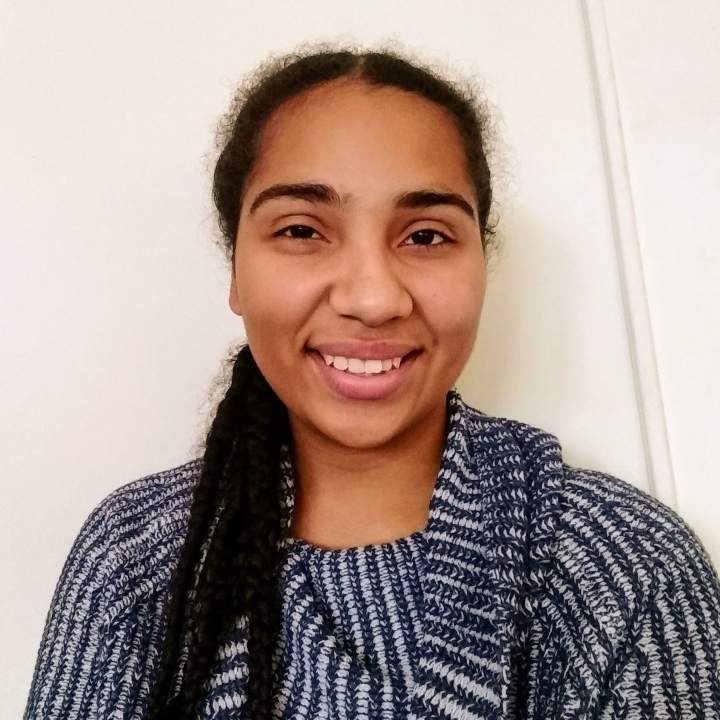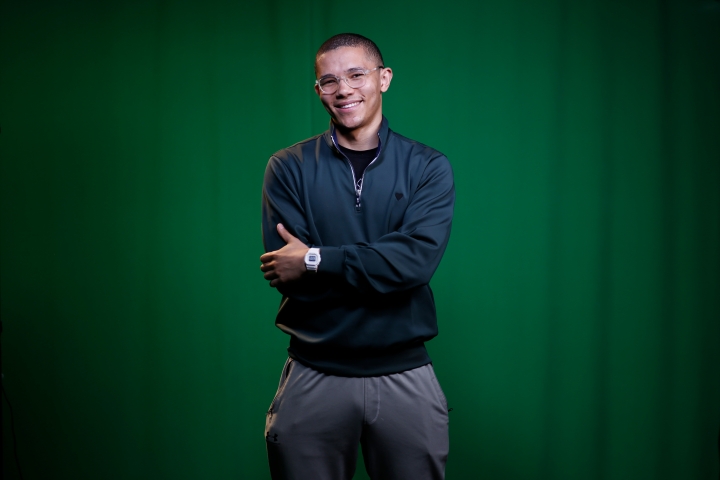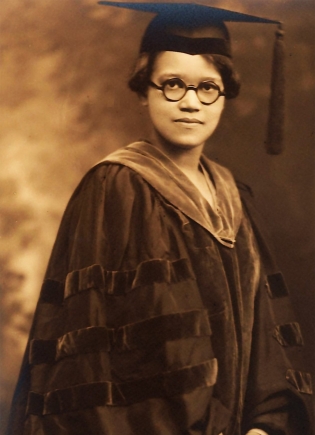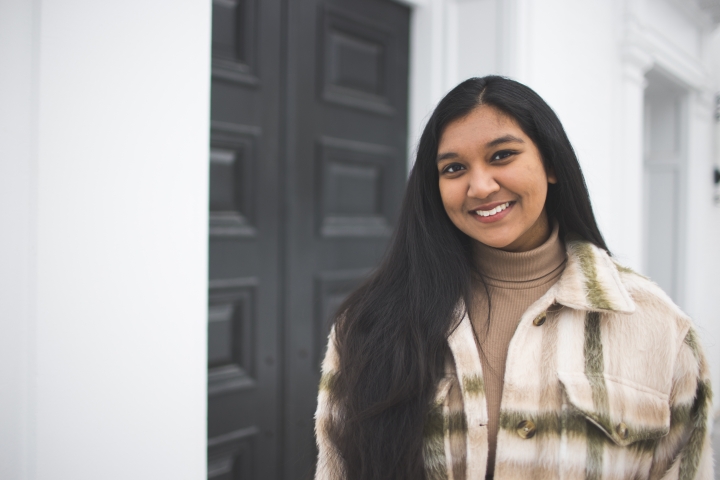Francina Kolluri ’24 arrived at Dartmouth thinking she was on a pre-med track. Her high school in Maryland had a strong science, pre-nursing, and pre-professional program, but no social science curriculum.
Then she took an introductory economics class and loved it, but felt like the other students were native speakers in a field of study that was new to her.
“I came from an underresourced high school, and I’ve always lived in low-income communities, so prior to Dartmouth, I didn’t really know what econ was. I’d heard of it. It was a distant idea. I’d never known anyone who had a degree in it or really what you could do with an econ degree,” she says.
She was feeling discouraged that first fall when she ran into Mothibi Penn-Kekana ’22, an economics and environmental studies major and Academic All Ivy soccer player who lived in the same East Wheelock dorm. He told her about the Sadie Alexander Association, a group founded by minority economics students in 2021 to provide support to underrepresented minority and first-generation students, and to help the Department of Economics explore ways to become more inclusive.
The Sadie Alexander Association’s focus is on encouraging students from underrepresented groups to give economics a look.
“I had just taken an Econ 1 exam and I was venting to him about how badly I think I did, and he said there is this organization, if you need support come to our meetings, and so I just very casually started going to meetings, but I found a really close-knit community that was really special to me,” says Kolluri, who is now on the leadership council of the association.
Jenique Richards ’22, a first-generation college student who is now an underwriter for Travelers Insurance in her home state of Connecticut, co-founded the Sadie Alexander group with Penn-Kekana and Laura Francisco ’22.

“The social unrest following the murder of George Floyd caused the economics department to re-evaluate what the student demographic makeup of the department was, and to see there’s a vast underrepresentation of historically underrepresented minorities. So they decided to talk to some students who were currently majors,” says Richards, who double-majored in math and economics.
Department chair Andrew Samwick, the Sandra L. and Arthur L. Irving ’72a P’10 Professor of Economics, says efforts to build a more inclusive scholarly environment accelerated with the department’s Statement on Racial Justice in June 2020.
“Instrumental to that commitment was greater engagement with students from historically underrepresented groups, and we have been very fortunate to have the collaboration of the Sadie Alexander Association,” says Samwick. “The group’s founders and subsequent leadership have enabled us to better understand the concerns and aspirations of our students.”
The association also works with the department to host events such as the Lectures on Inequality, Discrimination, and Opportunity “that showcase the role of economics in understanding and helping to address complex social challenges,” Samwick says.

“All the senior economics professors would get feedback directly from us. What’s hard, what’s good, what could be better,” says Penn-Kekana, who now works in mergers and acquisitions for Goldman Sachs in his native London. Throughout the process, he says, “They were willing to listen to us and they wanted to show us, ‘we care, and this is a priority, and this is what we’re trying to do.’”
Claudia Olivetti, the George J. Records 1956 Professor of Economics, was a member of the economics department’s diversity committee when the association was coming together.
“We’re learning from them, they’re learning from us. It really goes both ways,” she says. “The most important thing is to keep communication open.”
When the students started writing the charter for the new group, Sadie Alexander’s name came up in discussions of the history of the discipline, says Olivetti, now an adviser to the group. In 1921, Alexander became the first Black woman in the United States to receive a PhD in economics, but she was never granted a university position in her field. She earned a law degree from the same university, University of Pennsylvania, in 1927 and was a practicing lawyer and civil rights activist until her death in 1989.

“They were really inspired by the story of Sadie Alexander. They thought, even if she didn’t have a chance to be an economist—being both a woman and Black—they would honor her,” says Olivetti, who was herself a first-generation college student.
Professor of Economics Andrew Levin, co-adviser with Olivetti, says celebrating Alexander, who was just named, posthumously, a distinguished fellow by the American Economic Association last April, should remind academics in the field of how much more work needs to be done.
“That’s the bigger picture. At universities and colleges across the country, many are eager to have more diverse members in their departments. But getting the flow of underrepresented minority and first-gen students all the way along that pipeline—going on to graduate school, becoming faculty, becoming economists, becoming role models—we have a long way to go,” says Levin.
While career tracks and the “pipeline” are important, the Sadie Alexander Association’s focus is on encouraging students to give economics a look, says Richards.
“It’s not really about what your career will be, it’s initially about doing well in economics classes that term.”
Kolluri says the support and guidance of students from similar backgrounds who have succeeded in the field has helped her in many ways.
“The Sadie Alexander Association was also a large part of me selling this idea of econ to my parents,” says Kolluri, who will be interning this summer for Bank of America as a corporate banking analyst.
“Talking to my parents about this support group was huge, because when I told them that I wanted to do a banking internship, they thought that I wanted to become a teller. They were like, ‘I don’t think that’s very well-paid.’ But I said, don’t worry, there is a good path for me at Dartmouth.”
